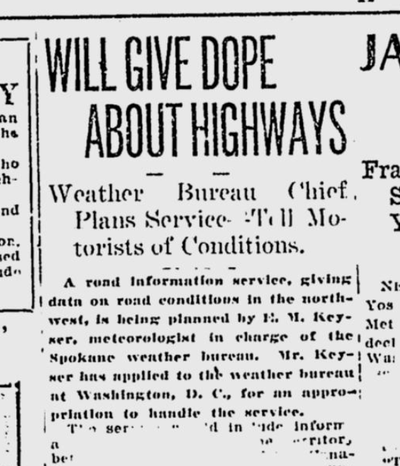100 years ago in Spokane: Daily road condition reports on the way for mud-phobic motorists

Motorists in the region would soon be getting a new service – a daily report on highway conditions in the Northwest.
This was the brainchild of E.M. Keyser, the meteorologist in charge of the Spokane office of the federal Weather Bureau.
“There is no reason that this road service should not be established in the weather office in Spokane,” said Keyser. “… The (head of) the Good Roads Bureau has given it his hearty endorsement and has advised me that spring and fall months are the time when the service is most needed.”
In 1921, mud rivaled snow and ice as an impediment to motorists.
Keyser explained that road condition information would be gathered daily via telegraph, telephone and “special mail service.” Then his office would compile the information and send it to every city in the bureau’s territory, which stretched from Walla Walla to the Canadian border, and the Cascades to the Rockies.
From the tax beat: The Spokane Daily Chronicle editorial page took a firm stance against a new state poll tax.
This controversial tax levied $5 on each citizen in the state between ages 21 and 50, who (in the words of the Chronicle editorial) “is not insane, a pauper or an idiot.”
The Chronicle said the bill was passed as an “emergency” measure, which meant the public was deprived of any chance to vote on the matter. It defied the people’s will, said the editors. It also “hits those who are already bearing too great a share of the burden.”
The Chronicle was careful to say opponents of the tax should pay it promptly. However, they should also begin working immediately to repeal the tax during the next legislative session.